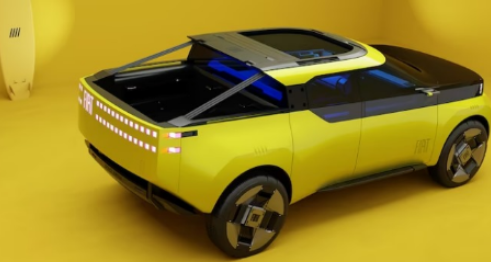
In the eyes of many American car buyers, Fiat may be perceived as a small and determined automaker overshadowed by larger players in the industry. However, globally, the Italian brand stands as a titan, particularly renowned for models like the 500 and the Panda. One reason for Fiat’s relatively subdued popularity in the United States is its limited offerings, primarily centered around a few variations of the 500, including the electric Fiat 500e hatchback.
READ: Navigating Amsterdam’s Waterways: A Canal Cruise Experience
Fiat
During Fiat’s presentation at the Geneva Motor Show, the company unveiled plans to introduce its upcoming models globally, providing a glimpse of what lies ahead. Fiat is preparing to launch a new lineup of vehicles inspired by the Panda, a beloved compact SUV not available in the American market. The debut of the first Panda-based vehicle is scheduled for July this year, with subsequent models set to follow each year through 2027.
Each new model will utilize the Stellantis “multi-energy platform,” offering flexibility with EV, hybrid, or traditional internal combustion engine (ICE) powertrain configurations. Embracing the prevailing trend, Fiat emphasizes modularity, allowing owners to customize both the interior and exterior to suit their preferences. However, it’s advisable to approach modular features with caution, as not all concepts make it to production.
Among the showcased concepts, the “Pick-Up” stands out as a potential entrant to capture the North American market’s appetite for small trucks. Drawing inspiration from the Panda, this concept is positioned as a “pure expression of fun and function.” Featuring a modular roof rack with configurable brackets, the Pick-Up concept allows adjustments to accommodate various cargo types. Notable is the ability to remove portions of the headlight bar and mount them on the roof rack, although this feature’s production viability remains uncertain.
The “City Car” concept serves as the foundational model for subsequent concepts, featuring a modular dashboard with an oval motif inspired by Fiat’s rooftop test track. The exterior design incorporates modern trends with hard edges and curves, reminiscent of late-1980s/early-90s skateboard culture. Sustainable materials, including recycled plastics and bamboo-based fabrics, are showcased, along with a retractable cable feature for EV configurations.
The “Fastback” concept, succeeding the current model sold in Brazil and the Tipo from the Middle East and Africa, resembles the Pick-Up but with sharply slanted rear glass. While specific features are not detailed, it is anticipated that modular elements will be incorporated in the production version.
The “SUV” concept, referred to as a “Giga-Panda,” targets large families, though details distinguishing it from other concepts are not highlighted. Fiat may unveil more information closer to the production date.
The “Camper” concept takes inspiration from the original 1980 Panda concept, featuring a higher roof, safari-style rack system, and a raised suspension for off-road capability. A standout feature is an inflatable tent contained within a roof-mounted pod, complete with a ladder for access. The Camper concept shares the removable LED light pods with the City Car, potentially enhancing its versatility.
Fiat’s ambitious global approach with the Panda-inspired lineup signals a strategic move to expand its presence and cater to diverse preferences worldwide. The success of these concepts may determine Fiat’s ability to capture the attention of a broader audience, including the dynamic American market.